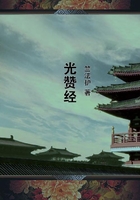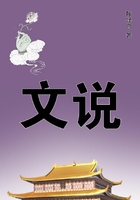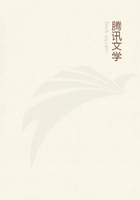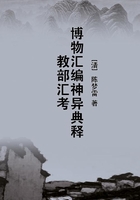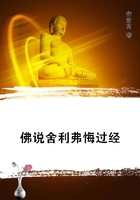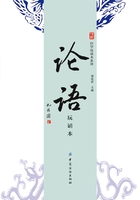Presently the old woman's whispering grew more animated and intelligible, while constantly, amid the wheezed mutterings, sheet lightning cut the black square of the window space with menacing flashes, and seemed, with their blue glare, as it shot through the tomblike hut, to cause the candle's flickering flame to undergo a temporary extinction, a temporary withdrawal, and the grey bristles on the dead man's face to gleam like the scales of a fish, and his features to gather themselves into a grim frown. Meanwhile, like a stream of cold, bitter water dripping upon my breast, the old woman's whispered soliloquy maintained its uninterrupted flow.
At length there recurred, somehow, to my mind the words which, impressive though they be, never can assuage sorrow--the words:
"Weep not for me, Martha, nor gaze into the tomb, for, lo, I am risen!"
Nay, and never would THIS man rise again. . . .
Presently the bony old woman returned with a report that nowhere among the huts could a Psalter be found, but only a book of another kind. Would it do?
The other book turned out to be a grammar of the Church Slavonic dialect, with the first pages torn out, and beginning with the words, "Drug, drugi, druzhe." ["A friend, of a friend, O friend."]
"What, then, are we to do? " vexedly asked the smaller of the dames when I had explained to her that a grammar could work no benefit to a corpse. As she put the query, her small, childlike face quivered with disappointment, and her eyes swelled and overflowed with tears.
"My man has lived his life," she said with a sob, "and now he cannot even be given proper burial! "
And, similarly, when next I offered to recite over her husband each and every prayer and psalm that I could contrive to recall to my recollection, on condition that all present should meanwhile leave the hut (for I felt that, since the task would be one novel to me, the attendance of auditors might hinder me from mustering my entire stock of petitions), she so disbelieved me, or failed to understand me, that for long enough she could only stand tottering in the doorway as, with twitching nose, she drew her sleeve across her worn, diminutive features.
Nevertheless she did, at last, take her departure.
*******************************
Low over the steppe, stray flashes of summer lightning still gleamed against the jet black sky as they flooded the hut with their lurid shimmer; and each time that the darkness of the sultry night swept back into the room, the candle flickered, and the corpse's prone figure seemed to open its half-closed eyes and glance at the shadows which palpitated on its breast, and danced over the white walls and ceiling.
Similarly did I glance from time to time at HIM, yet glance with a guarded eye, and with a feeling in me that when a corpse is present anything may happen; until finally I rallied conscience to my aid, and recited under my breath:
"Pardon Thou all who have sinned, whether they be men, or whether they, being not men, do yet stand higher than the beasts of the field."
However, the only result of the recitation was to bring to my mind a thought directly at variance with the import of the words, the thought that "it is not sin that is hard and bitter to ensue, but righteousness."
"Sins wilful and of ignorance," I continued. "Sins known and unknown. Sins committed through imprudence and evil example. Sins committed through forwardness and sloth."
"Though to YOU, brother," mentally I added to the corpse, "none of this, of course, applies."
Again, glancing at the blue stars, where they hung glittering in the fathomless obscurity of the sky, I reflected:
"Who in this house is looking at them save myself?"
Presently, with a pattering of claws over the beaten clay of the floor, there entered the dog. Once or twice it paced the length of the room. Then, with a sniff at my legs, and a grumble to itself, it departed as it had come. Perhaps the creature felt too old to bay a dirge to its master after the manner of its kind. In any case, as it vanished through the doorway, the shadows- -so I fancied--sought to slip out after it, and, floating in that direction, fanned my face with a breath as of ice, while the flame of the candle flickered the more-- as though it too were seeking to wrest itself from the candlestick, and go floating upwards to join the band of stars-- a band of luminaries which it might well have deemed to be of a brilliance as small and as pitiful as its own. And I, for my part, since I had no wish to see what light there was disappear, followed the struggles of the tiny flame with a tense anxiety which made my eyes ache.
Oppressed and uneasy all over as I stood by the dead man's shoulder, I strained my ears and listened, listened ever, to the silence encompassing the hut.
Eventually, drowsiness began to steal over me, and proved a feeling hard to resist. Yet still with an effort did I contrive to recall the beautiful prayers of Saints Makari Veliki, Chrysostom, and Damarkin, while at the same time something resembling a swarm of mosquitos started to hum in my head, the words wherein the Sixth Precept issues its injunction to: " all persons about to withdraw to a couch of rest."
And next, to escape falling asleep, I fell to reciting the kondak [Hymn for the end of the day] which begins:
"Oh Lord, refresh my soul thus grievously made feeble with wrong doing."
Still engaged in this manner, suddenly I heard something rustle outside the door. Then a dry whisper articulated:
"Oh God of Mercy, receive unto Thyself also my soul!"
Upon that, the fancy occurred to me that probably the old woman's soul was as grey and timid as a linnet, and that when it should fly up to the throne of the Mother of God, and the Mother should extend to that little soul her tender, white, and gracious hand, the newcomer would tremble all over, and flutter her gentle wings until well nigh death should supervene.
And then the Mother of God would say to Her Son:
"Son, pray see the fearfulness of Thy people on earth, and their estrangement from joy! Oh Son, is that well?"

